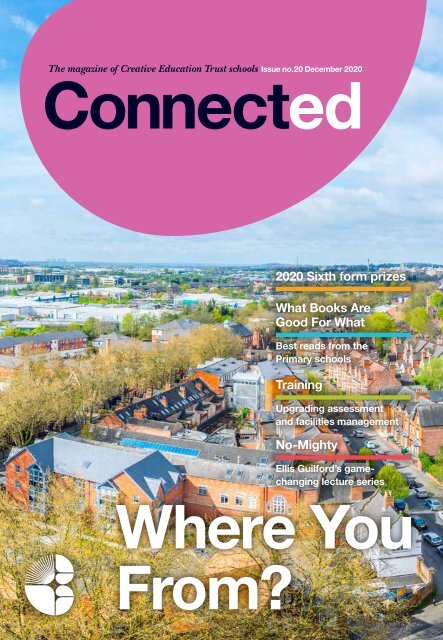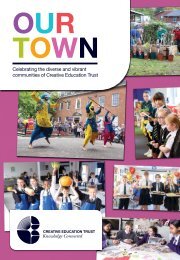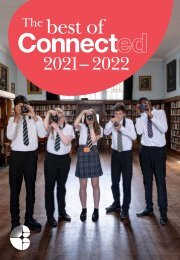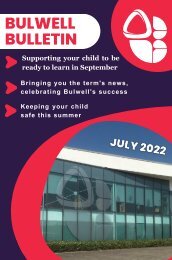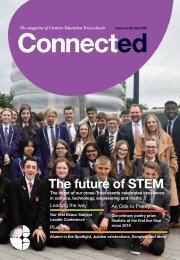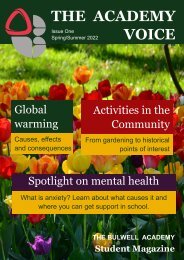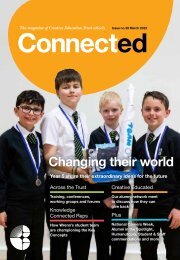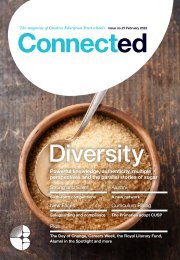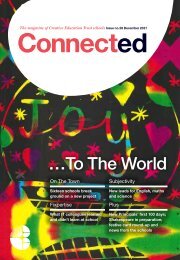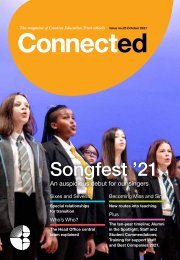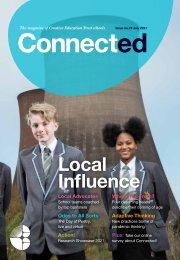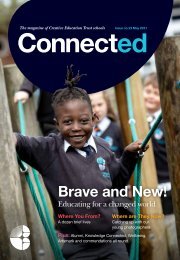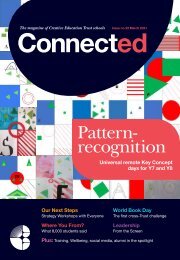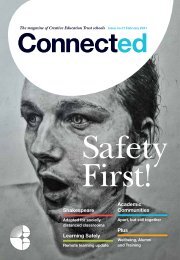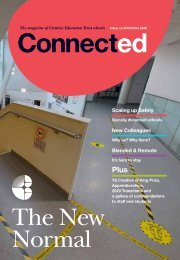Connected issue 20
The 20th issue of Connected: the magazine of Creative Education Trust schools. In this issue: • A report on the fantastic Sixth Form Prize finals for the Public Speaking and Essay competitions • Book recommendations from our primary school teachers, together with musings on what reading is good for anyway • Tips on setting up virtual lectures, and the experience of one music teacher creating online opportunities for his students
The 20th issue of Connected: the magazine of Creative Education Trust schools.
In this issue:
• A report on the fantastic Sixth Form Prize finals for the Public Speaking and Essay competitions
• Book recommendations from our primary school teachers, together with musings on what reading is good for anyway
• Tips on setting up virtual lectures, and the experience of one music teacher creating online opportunities for his students
Create successful ePaper yourself
Turn your PDF publications into a flip-book with our unique Google optimized e-Paper software.
The magazine of Creative Education Trust schools Issue no.<strong>20</strong> December <strong>20</strong><strong>20</strong><br />
<strong>Connected</strong><br />
<strong>20</strong><strong>20</strong> Sixth form prizes<br />
What Books Are<br />
Good For What<br />
Best reads from the<br />
Primary schools<br />
Training<br />
Upgrading assessment<br />
and facilities management<br />
No-Mighty<br />
Ellis Guilford’s gamechanging<br />
lecture series<br />
Where You<br />
From?
02<br />
<strong>Connected</strong><br />
The magazine of Creative Education Trust schools<br />
Issue no.<strong>20</strong><br />
December <strong>20</strong><strong>20</strong><br />
03<br />
What Books are Good for What<br />
Creative Education Trust’s best<br />
primary school reads of <strong>20</strong><strong>20</strong><br />
Jemma Adlington, Deputy Headteacher, Harpfield,<br />
reminds us that reading is at the heart of the primary<br />
curriculum:<br />
“A good book not only creates a love of<br />
reading, it broadens horizons – taking<br />
children to new places, introducing<br />
them to other people, immersing them<br />
in different cultures and travelling back<br />
to other time zones. In primary schools,<br />
every pupil has access to a wide<br />
range of texts to elevate their reading<br />
experiences. The book choices we make<br />
are linked to the learning experiences<br />
we expect children to have: stories that<br />
continuously challenge literacy abilities,<br />
link to curricular topics, and enrich<br />
the overall educational experience are<br />
crucial. Staff are role models, and by<br />
promoting a love of reading through<br />
clever book choices, we can enable<br />
our pupils to select the best books<br />
for themselves as they start out on a<br />
journey as life-long readers. In a year<br />
when fiction provided an immediate escape for many children<br />
in the UK, we’ve drawn together a selection of ‘best books’<br />
and asked Creative Education Trust primary literacy leads<br />
for their thoughts on what these books are good for.”<br />
Isaac Howarth, Headteacher,<br />
Queen Eleanor<br />
It goes without saying that reading is fundamental to<br />
learning. I want to reconnect us with why books are<br />
magnificent and share a few of my personal favourites<br />
too. Books are windows onto other worlds, they can<br />
be works of art in-and-of themselves and they can<br />
provide us with some of our longest-lasting memories.<br />
As primary school educators, we have the pleasure<br />
of introducing our young pupils to our favourite books,<br />
building that attachment to certain books that can<br />
last a lifetime.<br />
Books serve a lot of purposes: they are necessary for<br />
teaching very young children how to read and they<br />
expose them to new language and vocabulary that we<br />
often don’t use in daily speech. Maryanne Wolf’s book<br />
Proust and the squid: The story and science of reading<br />
is a great book on the importance of ‘story book<br />
language,’ including stock phrases such as “Once upon<br />
a time…” and very uncommon words like “elfin” that<br />
feature heavily in fairy tales. However, books can also<br />
be storehouses of culture and memory. When it comes<br />
to considering why we need certain books in our<br />
lives, literary critic Northrop Frye, in his The Educated<br />
Imagination, asks one simple but profound question of<br />
reading a book: “Does it help us to think more clearly,<br />
or feel more sensitively, or live a better life than we<br />
could without it?” Here are a few books that have<br />
made my life better.<br />
The Welcome to the Museum series is worth your<br />
time; planned as a bound version of a trip through<br />
a museum and covering a vast array of topics. My<br />
personal favourite is the book, Planetarium. The<br />
book is so elegant, it almost belongs in an art gallery.<br />
The textured artwork captures the majesty of the<br />
cosmos, even for those who are still learning to read,<br />
the visuals are more than enough to inspire awe and<br />
wonder. That makes it the perfect book for sharing<br />
with someone else.<br />
Books can also give<br />
us a sense of homely<br />
comfort. For me,<br />
Arnold Lobel's Frog<br />
and Toad books are my<br />
go-to books. My copies<br />
certainly show their age<br />
and although they could<br />
easily be replaced with<br />
quick order online, there<br />
is something precious<br />
about handing down<br />
an object that over<br />
time has had so many<br />
memories attached<br />
to it. Sitting down<br />
to read Frog and<br />
Toad, hearing my<br />
three year-old<br />
begin to sound<br />
out those first<br />
few words from<br />
the same pages I<br />
read decades ago; there is<br />
something very rewarding in knowing that you are<br />
helping another generation build happy memories<br />
of books.<br />
There are hundreds of other treasured books that<br />
we can’t imagine life without. It is that love of books<br />
we all share that helps our pupils grow to be avid<br />
readers, keeping those beloved stories alive for<br />
another generation. So, go on, dig out your favourite<br />
old books and let your pupils see what it means to<br />
enjoy reading.
04<br />
<strong>Connected</strong><br />
The magazine of Creative Education Trust schools<br />
Issue no.<strong>20</strong><br />
December <strong>20</strong><strong>20</strong><br />
05<br />
Uzma Ahmed, senior teacher<br />
and literacy lead, Harpfield<br />
The American wit, Mason Cooley, said, “reading<br />
gives us some place to go when we have to stay<br />
where we are.” It feels apt to open with his quote<br />
in <strong>20</strong><strong>20</strong>. At Harpfield, we promote a love of books<br />
by putting reading at the heart of the opportunities<br />
we offer: As our Ofsted inspection report identified,<br />
“the school’s wider curriculum provides pupils with<br />
a range of experiences and opportunities that are<br />
rooted within a strong literacy focus.” We begin<br />
from Nursery, where books and nursery rhymes<br />
intertwine to provide rich language experiences;<br />
then, throughout each key stage we continue to<br />
use quality texts that link curricular topics with<br />
children’s book choices. For example, at Key<br />
Stage 2 The Invention of Hugo Cabret by Brian Selznick helps the<br />
children to explore their art skills as they learn about earth and space.<br />
My read of the year, Onjali Rauf’s book, The Boy at the Back<br />
of the Class, is very personal to Harpfield. We have pupils from varied<br />
backgrounds, ethnicities, religions and cultures, but the collective feel<br />
of ‘family’ is undeniable despite the many differences. The book tells the<br />
story of an empty chair at the back of the class which is filled by a new<br />
child. It follows the journey of a refugee boy called Ahmet and intricately<br />
reveals his experiences. Without spoiling the story for anyone who<br />
hasn’t yet had the pleasure of reading it, the book highlights children’s<br />
enormous capacity to love without prejudice. Ahmet’s treatment by<br />
friendly classmates feels so very Harpfield to me.<br />
“the book highlights children’s<br />
enormous capacity to love<br />
without prejudice.”<br />
When we model a love of reading, we are<br />
demonstrating to children the magic of wonder.<br />
Books are more than paper and words; they are<br />
a sense of adventure and even belonging.<br />
The familiarity we feel with settings and<br />
characters is a sign of a well written book we’ve<br />
enjoyed. We must expose our pupils to books<br />
with care: asking ourselves questions about<br />
representation and updating our texts regularly<br />
to keep them relevant. To be inspired and to<br />
aspire, children need to see names of authors<br />
which sound like their names. They need to hear<br />
about characters who share their experiences.<br />
They need to read names and see pictures of<br />
children who look like them. They need and<br />
deserve to feel part of the literature we want<br />
them to love and enjoy. It starts with us.<br />
Richard Denny,<br />
English Lead,<br />
Wroughton<br />
At Wroughton we’ve adopted Literacy Counts’s Read to<br />
Write scheme by. Each term or half term we focus on a<br />
book as a vehicle for different types of writing. We will be<br />
using Hansel and Gretel, written by Neil Gaiman and<br />
illustrated by Lorenzo Mattotti, as a stimulus to write dual<br />
narratives and persuasive letters in the summer term. It’s<br />
a familiar tale: two children abandoned in a forest by their<br />
reluctant father. As they try to escape, they stumble across<br />
a strange and wonderful house that holds a dark secret….<br />
There are so many reasons to love this book. First of<br />
all, Neil Gaiman’s stories are deliciously dark and have a<br />
mysterious air to them. This appeals to the teenager in me<br />
who loved supernatural stories growing up. It is beautifully<br />
written containing many effective techniques, such as<br />
phrases woven into the text that make you sit up and want to<br />
read on. The illustrations are stunning – Lorenzo Mattotti uses<br />
Alex Barton, Year<br />
3 teacher and<br />
Reading Lead,<br />
Three Peaks<br />
I have chosen Owen and<br />
the Soldier by Lisa Thompson, which is published by Barrington<br />
Stoke – an excellent dyslexic-friendly publisher with a selection<br />
of great reads for all ages. I used this book with my year 3 class<br />
during Remembrance month because of its subtle connections to<br />
the war. Not only did it promote themes of empathy and bravery,<br />
but I also found children could really identify with the character<br />
and appreciate his resilience and courage throughout the story.<br />
The book follows a young boy called Owen. Ever since losing<br />
his dad in the war, life with mum at home has been challenging.<br />
Mum has lost all motivation and happiness. When a crumbling<br />
stone soldier faces expulsion from the local park, only Owen<br />
understands how significant it is for the local town. He decides<br />
to take action.<br />
At two points in the book, Owen’s writing experiences present<br />
parallel opportunities for pupils in the classroom too. He<br />
addresses a poem to the local councillor, a moment that<br />
plays a vital role in saving the stone soldier and giving pupils<br />
a stimulating example of poetry-writing. Owen also writes<br />
a letter to the local newspaper about the importance of keeping<br />
the stone soldier in the park, highlighting to pupils the effect<br />
of persuasive writing techniques.<br />
This book is perfect for a lower Key Stage 2, or perhaps even<br />
a year 2 class, as it bridges into chapter books without being<br />
too overwhelming. As with most Barrington Stoke books,<br />
the language is accessible, and the children can apply their<br />
comprehension skills confidently.<br />
charcoal to create black silhouettes<br />
and dark shadows of the forest.<br />
Boys, especially, get hooked into<br />
the darker elements of the story.<br />
The level of writing is aimed at the<br />
top end of year 6, so it challenges<br />
children’s understanding of text,<br />
while the illustrations are a<br />
wonderful stimulus for writing.<br />
The book is a chance to lose<br />
ourselves in a world very far away<br />
from our own. Children are eager<br />
to discuss the characters, plot and<br />
illustrations. At that moment, my<br />
class changes from being an<br />
English lesson into a book club<br />
discussion. I recommend reading<br />
this book as a springboard to other Neil Gaiman stories,<br />
which really help develop a stamina for reading.<br />
Laura Brett,<br />
Deputy<br />
Headteacher<br />
and English<br />
Lead,<br />
Woodlands<br />
Reading is a<br />
vehicle through<br />
which children<br />
can explore<br />
different worlds<br />
and adventures;<br />
it can feed their<br />
imagination and<br />
transport them to other places. This<br />
can be invaluable when things are tough.<br />
Reading can also provide discussion<br />
points, opportunities to express opinion<br />
and exposure to experiences they may<br />
not have encountered before.<br />
Wonder by R J Palacio is about a boy<br />
with facial disfigurement starting a new<br />
school. It is an<br />
amazing text to<br />
support the teaching<br />
of tolerance;<br />
it addresses<br />
differences in society<br />
and promotes<br />
discussion about<br />
the behaviours that<br />
sometimes result<br />
from prejudice.<br />
It enables you to<br />
discuss the role<br />
of empathy in<br />
relationships and<br />
understand different<br />
points of view.<br />
During Anti-Bullying week, it can be<br />
used as a route into inclusion as well as<br />
discrimination. It also links to genetics,<br />
so it can be used to support Evolution and<br />
Inheritance in science. We also use it to<br />
stimulate learning about different genres<br />
of writing, such as diaries, narrative and<br />
recounting experience. The story lends<br />
itself very directly to supporting children’s<br />
transition into secondary school.<br />
We develop our pupils’ life-long love of<br />
reading by immersing them in as many<br />
different types of text as possible. Books<br />
like Wonder can bring classes together<br />
through a shared emotional journey,<br />
whether it be funny or sad.
06<br />
Gwayne Webb, Director of Learning and<br />
Teaching, introduces exciting new initiatives to<br />
keep us learning as individuals and as a network<br />
of professionals responsible for the education of<br />
thousands of young people.<br />
Assessment<br />
<strong>Connected</strong><br />
The magazine of Creative Education Trust schools<br />
Professional<br />
Development and<br />
Organisational Learning<br />
Trust leaders have been working closely with subject<br />
leaders and the staff responsible for curriculum and<br />
assessment. Two crucial elements of our increasinglyaligned<br />
secondary curriculum have been the focus of the<br />
autumn’s training for key stakeholders: Key Stage 2/3<br />
transition, and Key Stage 3.<br />
Transition: assessing the unassessed<br />
In order to make sure we’re well prepared to support our<br />
new intake of year 7s and the teachers who teach them,<br />
we commissioned a suite of standardised tests from GL<br />
Assessment, the leading provider of formative<br />
assessments to UK schools. <strong>20</strong><strong>20</strong> is the first<br />
year since the introduction of Key Stage<br />
2 SATs in the early 1990s that, owing<br />
to the pandemic, the year 6 tests were<br />
not carried out. This means that our<br />
current cohorts of year 7 students have<br />
enrolled in secondary school without<br />
that important benchmarking data being<br />
available to support lesson planning and<br />
curriculum design. First, GL Assessment<br />
training ensured that our data managers<br />
were confident in setting up the tests,<br />
and actually running them. Subsequently,<br />
assessment leaders and some teachers –<br />
those with pastoral support responsibility<br />
for year 7 – have been trained in<br />
interpreting the test outcomes. This sets<br />
them up to accelerate the progress our<br />
young people make, and to catch them<br />
up with some of the learning they missed<br />
before they joined us. With a forensic<br />
understanding of the abilities of every<br />
year 7 child, we are equipped to support<br />
Training<br />
their transition and their<br />
academic and emotional<br />
development effectively.<br />
Assessment design<br />
Good assessment design is<br />
both a science and an art,<br />
and it requires considerable<br />
skill and experience to<br />
make it effective. Creative<br />
Education Trust is ensuring<br />
that Key Stage 3 students<br />
have access to high-quality<br />
and effective assessments<br />
by training over sixty of our<br />
teachers and curriculum<br />
leaders in assessment<br />
design and production.<br />
Dr Simon Child from<br />
Cambridge Assessment<br />
Network is leading weekly sessions as part of a longerterm<br />
and larger-scale teacher training experience. His<br />
organisation, which is closely aligned to the national<br />
examination boards, develops and delivers assessments,<br />
qualifications and tests for learners of all ages, across the<br />
full range of subjects and for use all around the world.<br />
Our own interactive professional development sessions<br />
have gone really well: the participants now understand<br />
the purposes and principles of good assessment; they<br />
can write effective assessment and multiple-choice<br />
questions and they can evaluate those written by others;<br />
they understand mark schemes and how to optimise<br />
them. Most excitingly, they are now poised to give their first<br />
assessments a go! We will have produced the first set of<br />
internally-designed tests by Christmas, and shortly after it, our<br />
young people will have sat the first set of our own bespoke<br />
examinations. The final part of the training will take place at<br />
the end of January <strong>20</strong>21.<br />
Alex Laney, Vice Principal at Thistley Hough (pictured above),<br />
will be working with the Education team to ensure our new<br />
KS3 assessment model is fully embedded.<br />
Research<br />
Our teachers – along with many of the other adults who<br />
support the safety, welfare and academic development of<br />
children from ages of 3 to 19 – are themselves academics<br />
who enjoy and value enquiry. Learning never ends. Creative<br />
Education Trust is committed not only to making learning<br />
a powerful entitlement of all children in our schools, but<br />
equally, for our staff. We have been keen to create research<br />
opportunities in relation to the creative thinking, knowledge<br />
and skills that will equip the Creative Education Trust child<br />
for the challenges of the 21st century. We began the term<br />
by inviting expressions of interest from colleagues across<br />
the Trust to participate in a pilot research enquiry to be<br />
launched, completed and showcased this academic year in<br />
one of the following areas: developing and implementing<br />
any aspect of the Trust’s Strategic Plan; improving our<br />
schools; developing our partnerships and generating<br />
collaborative working opportunities. Senior colleagues at<br />
Wrenn and the Head Teacher of Queen Eleanor<br />
have been working with me as Director<br />
of Learning and Teaching to develop<br />
a starting point.<br />
The opportunity to participate in<br />
this first round of action research<br />
was open to everyone at every<br />
level in the Trust and we had 33<br />
expressions of interest covering<br />
a range of topics, from effective<br />
pedagogy, blended learning and<br />
metacognition, to curriculum<br />
enrichment, growth mindset and<br />
well-being. The steering group has<br />
filtered these declared research<br />
interests into three bands:<br />
1. Effective pedagogy, led<br />
by headteacher of Queen<br />
Eleanor Primary, Isaac<br />
Howarth<br />
2. Tackling disadvantage under the leadership of<br />
Wrenn’s Vice Principal, Nimish Lad<br />
3. Coaching strategies, led by Dawn Ashbolt,<br />
Assistant Principal at Wrenn<br />
All three research groups will be supported by the leader<br />
of Professional Learning and Action Research at Wrenn,<br />
David Howell, who is also the Assistant Principal. At the<br />
enquiry launch meeting, Nicole McCartney, Director of<br />
Education, set out the vision for the first year of work,<br />
and Wrenn colleagues shared the positive impact of their<br />
research experiences. The enquiry has begun. <strong>Connected</strong><br />
will follow the participants and showcase the outcomes in<br />
the summer term.<br />
We congratulate Nimish Lad, Vice Principal of Wrenn (pictured<br />
above), on his contribution to Tom Sherrington’s In Action series<br />
to be published next year. Nimish brings his abundant experience<br />
with researchED to his appointment as the Curriculum and<br />
Research Lead for our Research Inquiry Group.<br />
Stuart Sams, Regional Site<br />
Manager for Milton Keynes,<br />
Wrenn, Ash Green and Three<br />
Peaks, explains the context and<br />
ambitions of the new training<br />
resources for site teams across<br />
sixteen estates from North<br />
Staffordshire to East Norfolk.<br />
Issue no.<strong>20</strong><br />
December <strong>20</strong><strong>20</strong><br />
Facilities: Covid<br />
and Beyond<br />
Over the last 12 months the Estates<br />
and Facilities team has worked hard<br />
to create and roll-out a Management<br />
Information platform where all facilities<br />
and Health & Safety can be effectively<br />
and safely managed to measure compliance and help us manage<br />
risks. The system came with essential and helpful training<br />
modules which have supported the growth in competence of our<br />
whole team. This year has required a step-change in the way that<br />
site and estates team members work and as a result of Covid-19,<br />
we now have a Trust-wide, consistent approach to the<br />
management of our estates. It’s time to move up a level.<br />
The teams are working hard to provide a customer-orientated<br />
service that supports all the schools in making facilities both<br />
safe and uplifting. We believe the best way to retain and grow this<br />
team further is to develop their skills and expertise. Recognising<br />
that it’s critical to engage everyone, we have enrolled all the<br />
Facilities Managers as members of the Institute of Workplace<br />
and Facilities Management (IWFM), the UK governing body for<br />
facilities management.<br />
IWFM’s Professional Development Framework will assess our<br />
employees’ competencies, enabling Creative Education Trust to<br />
use their development tools for tailored training and qualifications.<br />
In addition, we’ll be rolling out a new and comprehensive package<br />
of H&S training in <strong>20</strong>21 for all site team staff. In becoming a<br />
corporate member of IWFM, the Trust will clearly demonstrate<br />
our commitment to the support and development of our staff<br />
and the delivery of best industry practice. This sends a clear<br />
message to our existing and prospective schools that we are<br />
at the forefront of facilities management.<br />
All our staff on the scheme will have full access to our range<br />
of member benefits including:<br />
• Knowledge and resource documentation.<br />
• Unlimited access to IWFM’s library of resources.<br />
• Exclusive insights and networking and development<br />
opportunities.<br />
• Improved corporate profile.<br />
• Membership grades from Associate to Fellow of IWFM<br />
depending on qualifications and experience.<br />
07
08<br />
<strong>Connected</strong><br />
The magazine of Creative Education Trust schools<br />
Issue no.<strong>20</strong><br />
December <strong>20</strong><strong>20</strong><br />
09<br />
Where<br />
You<br />
From?<br />
Social distancing and travel restrictions didn’t<br />
stop Creative Education Trust’s annual Sixth<br />
Form prizes. This year’s prompt ‘Where You From?’,<br />
surfaced an impressive depth and imaginative<br />
engagement across both contests: from the<br />
biological determinism of DNA to the material<br />
substance of the human body and the immaterial<br />
Internet, via identity, race and regional prejudice.<br />
On 26 November, five speakers confidently defied the weird<br />
challenge of the videocam to address a dispersed and invisible<br />
audience. Katie Scarrott (Wrenn), Hollie Dalton (Ash Green),<br />
Erin Palmer (Abbeyfield), Ifeanyi Felukwu (Bulwell) and<br />
Alicia Astle (Hart) applied impressive rhetorical flair, elegantly<br />
turned phrasing, humour, expressive gestures and paced<br />
delivery to make their arguments. Some discussed ‘place’ in<br />
terms of new experiences generated by the contemporary<br />
pandemic, drawing attention to how technology, the Internet<br />
and digital developments might be altering people’s sense of<br />
where they’re from. One reminded us that we are located as<br />
global citizens with a responsibility to take care of each other<br />
and counter the threats to our place in the world. Another<br />
interrogated the assumptions and biases contained in the<br />
question ‘where you from?’<br />
This year’s judges, Sue Freestone, Director of Education<br />
at the Kalisher Trust, Kirsty Dias, Director at international<br />
design company PriestmanGoode, and Nicole McCartney,<br />
Creative Education Trust Director of Education, finally agreed<br />
unanimously that Ifeanyi Felukwu, Bulwell, deserved<br />
first prize. He had explored the prompt question from the<br />
perspective of a Nottingham teenager strengthened by family<br />
in Nigeria and Christian faith. Ifeanyi spoke with poise, focus<br />
and a poetic sensitivity to language that conjured a confident<br />
sense of self and belonging.<br />
“…it would be easier to say ‘born in<br />
the UK, both parents originally from<br />
Nigeria’, making me Black British.<br />
Simple, right? No. Where I’m from<br />
isn’t as straightforward as the<br />
things that appear official, such<br />
as a passport, a birth certificate,<br />
a national record.”<br />
Guest judge Sue Freestone echoed our contestants' own<br />
feelings in her reply: what matters is not where you’re from<br />
or what you’ve done, but who you are and where you’re<br />
going. Her own life journey from farmer’s daughter to school<br />
principal, government advisor and Deputy Lieutentant for<br />
Cambridgeshire bore out her advice: finding your individual<br />
voice – whether in spite of, or because of where you’re from –<br />
is how we validate ourselves and effect change. “Be a voice”,<br />
she urged, “not simply a vehicle”.<br />
Below left to right, sixth form speakers; Alicia Astle (Hart), Ifeanyi<br />
Felukwu (Bulwell) Below right: Emily Campbell, Nicole McCartney<br />
and Sue Freestone applaud Ifeanyi for his winning speech.<br />
Overleaf left to right, clockwise, sixth form speakers: Katie Scarrott<br />
(Wrenn), Hollie Dalton (Ash Green), Erin Palmer (Abbeyfield)<br />
Far right: Fatima Sanneh (Bulwell), winner of the Essay Prize.<br />
Fatima Sanneh of Bulwell was announced at the same<br />
event as the winner of the <strong>20</strong><strong>20</strong> Essay Prize. She wove<br />
together a personal story of place, family and race with<br />
broader geographical histories and contemporary experience.<br />
Our judges appreciated the richness, maturity and fluency in<br />
writing, along with her mastery of structure.<br />
“The word “slave” to any Black<br />
person is a word that arouses<br />
anxiety, anger, frustration, and,<br />
to an extent, hatred. It is a word<br />
that demonstrates how the Black<br />
community was sold and mistreated<br />
for centuries. However, as a modern<br />
woman of a Black heritage I feel<br />
now it is time to reclaim that word.<br />
The word “slave” to me shows how<br />
strong my ancestors were to overcome<br />
such prejudice, how inspiring<br />
they were to forge a new path and<br />
demand equality, and how fortunate<br />
I am to come from a line of strong,<br />
Black women who know their worth<br />
and are determined to change their<br />
world for the better.”<br />
The Essay Prize invites sixth form students to write<br />
persuasively about a topic outside the formal curriculum.<br />
Through bespoke workshops, one-to-one tutorials and<br />
multiple drafting stages each with individual feedback,<br />
students learn to harness tried and tested techniques,<br />
acquire new writing habits and practise the discipline of<br />
a writer. The premise of the prize is that though the essay<br />
might be familiar to students in its mandatory and ‘boring’<br />
guises, it can also be an unexpected vehicle for individual<br />
invention and expression.<br />
The Essay Prize judges could not be better advocates, each<br />
having established a rich career as writers (of essays and more)<br />
and believers in the power of words. All students entering<br />
the competition receive constructive, written feedback on<br />
their essay from one of the judges, bringing them close to<br />
professional realities of re-drafting, editorial and proofreading.<br />
A shortlist of essayists have another chance to perfect their<br />
submissions before the panel meets to decide an overall<br />
winner. This final stage is crucial in developing an awareness<br />
of continuous improvement and attention to detail in research,<br />
analysis and argumentation.<br />
How to Write a Winning Essay<br />
Jessica Douthwaite asked each judge what they<br />
think defines excellent essay writing.<br />
Anjana Ahuja was educated<br />
at a comprehensive school in<br />
Essex and has a PhD in space<br />
physics from Imperial College<br />
London. She is a contributing<br />
writer on science for the Financial<br />
Times, writing a regular opinion<br />
column and contributes to<br />
other media outlets. She is a<br />
trustee of the charity Sense<br />
About Science and supports<br />
Speakers For Schools events.<br />
In February this year, Anjana<br />
wrote a compelling book review<br />
essay in the New Statesman which argued that while “genetics<br />
does not recognise race as a biologically meaningful concept,<br />
that doesn’t stop racists invoking its findings.” In June, she<br />
reflected on the consequences of rapid Covid-vaccine trials in<br />
an investigative essay for the Financial Times.<br />
Anjana’s essay writing musts:<br />
Work out what you want to say. If it helps, say it out<br />
loud before writing it down. If you don’t understand<br />
what you are trying to write, nobody else will.<br />
Be clear and concise.<br />
Give examples or analogies and cite evidence (and<br />
include your sources).<br />
Make every word, phrase and sentence earn its keep.<br />
If you don't absolutely need it, strip it out.<br />
Read widely. Read people you agree with – and people<br />
you disagree with.<br />
Work out what you enjoy reading, and critique why<br />
– is it the subject, the rhythm, the power of learning<br />
something new? On controversial subjects, learn your<br />
opponents’ arguments so you know how to counter<br />
them.<br />
Write like you know it.<br />
Write like you mean it.<br />
Write like it matters.
10<br />
<strong>Connected</strong><br />
The magazine of Creative Education Trust schools<br />
Issue no.<strong>20</strong><br />
December <strong>20</strong><strong>20</strong><br />
11<br />
Kate Bassett is the Literary Associate<br />
at Chichester Festival Theatre and has<br />
been a professor of Creative Writing at<br />
the University of Reading. Her book In<br />
Two Minds: A Biography of Jonathan<br />
Miller was shortlisted for the HW<br />
Fisher Best First Biography Prize, the<br />
Theatre Book Prize and the Sheridan<br />
Morley Prize for Theatre Biography.<br />
A veteran theatre critic for The Times,<br />
the Independent on Sunday, the Daily<br />
Telegraph and the Times Literary<br />
Supplement, she has served on<br />
judging panels for many literary awards and twice as<br />
Chair of the Edinburgh Comedy Awards.<br />
Jonathan Katz is a Fellow of St Anne's<br />
College, teaching Classical and Oriental<br />
languages and literature, and is Public<br />
Orator at the University of Oxford. He<br />
spent many years as a secondary school<br />
teacher, and is also a translator and an<br />
accomplished musician.<br />
Jonathan recommends looking at the winning essays of other<br />
students to reflect on the factors that led to their successes.<br />
For example, the previous years’ shortlist and winner of the<br />
Royal Geographic Society and Financial Times School Essay<br />
Competition is available to read online. Last year students<br />
tackled the question, ‘Is it better for the world to be wealthier<br />
or to be more equal?’<br />
Successes and special commendations<br />
Students…<br />
To Key Stage 3 students and the Art department<br />
at Ash Green, invited by the Bedworth Armistice<br />
Committee to exhibit artwork in commemoration<br />
of Remembrance Sunday at Bedworth Civic Hall<br />
in the absence of a<br />
parade this year.<br />
Kate recommends reading Jonathan Swift’s A Modest<br />
Proposal, published in 1729, as an example of outstanding<br />
essay writing. She says: “It’s a breathtakingly dark and potent<br />
satirical masterpiece. The opening paragraphs suggest<br />
the writer has come up with a humanely caring, eminently<br />
rational scheme by which starving, impoverished children can<br />
transform, through nurture, into being a benefit to society.<br />
This is followed, however, by a shocking twist through which<br />
Swift – ingeniously between the lines – proceeds to condemn<br />
hypocritical policy makers and the spin of callous capitalists.<br />
A Modest Proposal is still, very disturbingly, resonant today.”<br />
Kate’s advice on writing a prize essay:<br />
A brilliant essay might well have features that are<br />
surprising, that confound expectations, so I wouldn’t<br />
want to be overly prescriptive about prize-winning<br />
attributes. That said, the following tend to stand out as<br />
strengths:<br />
The demonstration of clear-headed and discerning<br />
thought processes;<br />
A structurally progressive argument, not slipping into<br />
repetitiveness<br />
Articulacy including an assured use of vocabulary,<br />
spelling, grammar and punctuation;<br />
End notes, if appropriate, properly referencing reliable<br />
sources to support claims made or statistics used in<br />
the essay.<br />
Passion and wit can also be great boons.<br />
These are Jonathan’s thoughts on writing<br />
and planning an excellent essay:<br />
The essay should be written in an English style more<br />
‘formal’ than colloquial. Sentences should be carefully<br />
constructed, each with a main verb and following the<br />
standard rules of punctuation and spelling.<br />
At the same time, the writing should be lively, and the<br />
words well chosen. Ideally, the subject will genuinely<br />
mean something important to the writer.<br />
Keep the title carefully and constantly in mind and<br />
beware of unnecessary digressions. Examples and<br />
counter-examples to illustrate points are of course<br />
not digressions, but never use more of them than<br />
are necessary to support the argument. The overall<br />
argument should be clear and clearly directional,<br />
building up a case as it goes.<br />
Each paragraph should be justifiable as a paragraph,<br />
contributing in its own way to the overall argument,<br />
and being related to what precedes and what follows.<br />
Succinct but sufficient use of evidence is important in<br />
supporting claims that might be questioned in such a<br />
way as to undermine the argument. ‘I think’, ‘I believe’<br />
etc. do not indicate evidence, but often the opposite!<br />
A plan is almost always an essential preliminary,<br />
preferably well considered and worked at well before<br />
the first words are written.<br />
To Elisha Brayford, year 4 at Harpfield, who started<br />
a YouTube guitar tutorial channel during the first<br />
lockdown of <strong>20</strong><strong>20</strong>. Elisha and her mum established<br />
rules around posting on social media so that she<br />
stays safe online and protects her privacy. A lovely<br />
idea Elisha, and a great way to share your<br />
musical talents with friends and<br />
followers, all keen to learn but<br />
distanced by Covid-19.<br />
To Bethany Dunn, year 10 pupil at Bulwell, and her<br />
mum, who almost tripled their annual fundraising goal<br />
of £1000 for When You Wish Up a Star – £2,921!<br />
Every year Bethany’s family organise a community<br />
Fun Day for the charity. Unable to hold a live event in<br />
<strong>20</strong><strong>20</strong>, they made and sold unique face masks and<br />
handmade goods.<br />
To Abigail Debenham, year 7<br />
at Abbeyfield who entered<br />
a ‘dream stationery’ design<br />
competition and won it with<br />
her creation, the ‘Enigma Pen’,<br />
which writes in top secret code.<br />
Abigail was awarded a set of<br />
her own stationery and £100<br />
worth of items to share among<br />
her tutor group at school.<br />
To Finnley Coles, year 11<br />
at Wrenn, who was invited<br />
to join the National England<br />
Under-17s Volleyball squad<br />
after several years representing<br />
the school and county in<br />
competitions. Having proved<br />
his talents at the national trials<br />
Finnley is now training for his<br />
first European championships<br />
in Norway.<br />
To year 7 Bulwell pupil, Iris Wallace,<br />
who won Nottingham Building Society’s<br />
Innovative Young People of <strong>20</strong><strong>20</strong><br />
award in her age category. Iris found a<br />
voluntary job before starting secondary<br />
school and has shown enormous<br />
dedication to her involvement at the<br />
Bulwell Forest Community garden,<br />
generating ideas, such as plant and<br />
tabletop sales, to keep the charity<br />
going through a difficult time.
12<br />
<strong>Connected</strong><br />
The magazine of Creative Education Trust schools<br />
Issue no.<strong>20</strong><br />
December <strong>20</strong><strong>20</strong><br />
13<br />
To year 13 pupil at<br />
Ash Green, Hollie<br />
Dalton, who raised<br />
£245 for her <strong>20</strong>21 trip to<br />
Kenya with Ash Green by<br />
completing a skydive.<br />
To Harry Ellott and Ryan<br />
Bradshaw, year 13 at Ash<br />
Green, for completing the<br />
Mathematics Admissions<br />
Test for Oxford University<br />
and the Cambridge Test of<br />
Mathematics for University<br />
Admission, respectively.<br />
Both are applying to<br />
university to read Computer<br />
Science.<br />
…and staff<br />
To Debbie Ling, Success Centre Manager at Abbeyfield, for winning a Highly<br />
Commended: Shining Star prize in the Northamptonshire Carers’ Awards.<br />
Debbie’s popular support service offers pupils who have additional responsibilities<br />
in the family home a place to meet, talk and share their experiences.<br />
To staff and students at Bulwell<br />
who made special efforts to mark<br />
Remembrance Day in place of the<br />
usual school commemorations.<br />
Themed activities throughout the day<br />
included tutor group assemblies, a<br />
visit from cadets, a two-minute silence<br />
and handmade wreaths displayed<br />
on the school restaurant doors.<br />
To staff of Wroughton, who contributed<br />
to the creation of a fantastic junior<br />
school wall display that celebrates the<br />
rich history and heritage of the local<br />
community. External designers have<br />
been consulting staff on the design since<br />
September and it was installed to great<br />
(and socially distant) ovation in October.<br />
To year 7 Abbeyfield pupil, Aminah Riaz,<br />
who won supermarket chain Lidl’s national<br />
competition to name and design a mascot<br />
for their fun size bananas. Aminah created<br />
the ‘Banana Llama’ and won via an overall<br />
majority of votes from the public on social<br />
media. Her design will be featured on product<br />
packaging in supermarkets across the country.<br />
To year 7 pupil, Lara Holland, Lynn Grove, who has won a prestigious short<br />
story writing competition run by local independent bookseller, Jarrold. Lara’s<br />
500-word story was chosen as the winner from over <strong>20</strong>0 entries and her prize<br />
is £75 in book tokens and publication in the Eastern Daily Press newspaper.<br />
To Weavers pupil,<br />
Charlie Mayhew,<br />
year 12, who won a<br />
gameboard competition<br />
through Isaac Computer<br />
Science, a revision website<br />
created by the Raspberry<br />
Pi Foundation. Charlie<br />
studies computer science<br />
A Level and his victory<br />
made him one of the<br />
top 40 highest achieving<br />
students in the country<br />
on his first attempt.<br />
To staff, students and especially the<br />
Creative Arts Department at Weavers,<br />
who produced a display of handmade<br />
fabric poppy pins to display to raise<br />
money for the Royal British Legion Poppy<br />
Appeal <strong>20</strong><strong>20</strong>. In form time, students and<br />
staff in each year group were challenged<br />
to create a different poppy. The design<br />
solutions ranged from applique and<br />
lazercut to pompoms and Suffolk puffs.<br />
To Alicia Ford. year 9 at Weavers<br />
who won a school competition<br />
organised by the Drama Department<br />
to honour Black History Month with<br />
an original and powerful performance<br />
of slam poetry. Watch her excellent<br />
performance here!<br />
To Olivia Anderton, a member of the catering team at Queen<br />
Eleanor, and the nursery class, for making and donating decorations<br />
for a Christmas tree at Northampton General Hospital. As a hospital<br />
volunteer, Olivia knew that children and staff would be keen to share<br />
the festive spirit with patients in spite of Covid-19 restrictions.<br />
To Head of Science, Claudia<br />
Cowap-Whiskin, at Milton<br />
Keynes, who successfully<br />
completed the National Professional<br />
Qualification for Senior Leadership<br />
(NPQSL). While working on her<br />
qualification she ran a project on<br />
student engagement with GCSE<br />
Pod, and demonstrated the impact<br />
that this online tool had on the<br />
performance of key cohorts.
14<br />
<strong>Connected</strong><br />
The magazine of Creative Education Trust schools<br />
Issue no.<strong>20</strong><br />
December <strong>20</strong><strong>20</strong><br />
15<br />
NO-<br />
Chris Collington, Head of Music<br />
at Ellis Guilford rounds up the <strong>20</strong><strong>20</strong><br />
Music Lectures Series<br />
Rich Shaw, Cradle of Filth (photo: Coventry City Council)<br />
MIGHTY<br />
Like a lot of good ideas this one started out more as a<br />
question of ‘could we?’ rather than ‘we will’.<br />
At Ellis Guilford we’ve enjoyed a long-term working relationship<br />
with Sean Dickson, a.k.a. ‘Hifi Sean’, formerly of 80’s pop<br />
rock band The Soupdragons and Kurt Cobain favourite<br />
BMX Bandits. Four years ago, classroom technology wizard<br />
Andy Jones and I were looking for material for the KS4 Music<br />
Technology students to remix when we took the unlikely step<br />
of messaging Sean via Facebook. Our request was for one<br />
track from his new album for the students to work their<br />
magic on. He replied the same night.<br />
Sean Dickson is a wonderfully humble man for someone who<br />
has seen it all. In amongst his tales of shopping sprees paid<br />
for by Michael Hutchence and late-night jam sessions with<br />
John Peel, there lies an unwavering desire to create – the more<br />
collaboratively the better. Sean’s been a regular mentor and<br />
collaborator for the Ellis Guilford Music Technology students,<br />
making an annual visit to school to work with us ever since.<br />
Four years and 100 remixes later and we suddenly find<br />
ourselves without one of the highlights of the our curriculum<br />
owing to Covid-19 restrictions.<br />
Sean offered, as he always does, to do more – “how about a<br />
video call?” But here is where the problem arises – we have<br />
four KS4 classes and only one Sean. Andy and I hatched a<br />
plan. If messaging industry professionals had worked four<br />
years ago, why not again? Why not attempt our first online<br />
lecture series? The musicians and composers call in, and the<br />
students – fresh from some research – pose the questions.<br />
Doable, right?<br />
You might think we sent out hundreds of messages, but in<br />
all honestly, most of the musicians we contacted returned<br />
to us fast and very positively!<br />
The first lecture, with Robin Richards of Dutch Uncles,<br />
was a fascinating discussion into the process of composition<br />
and modern musicianship.<br />
HiFi Sean joined Year 11 and covered the ‘misinformation’ of<br />
fame, getting noticed and, most crucially, what really makes<br />
a great piece of music. “What I liked most was gaining the<br />
confidence to create my own sound” recalls student Ashton<br />
Nunn. “To begin with I was creating sounds that I thought<br />
other people would like and was worried Sean would be<br />
upset if I ruined his track. Now I am creating something truly<br />
terrifying and unrecognisable based around his original bass<br />
line and lyrics”.<br />
Stuart Braithwaite of Scottish giants Mogwai was next on the<br />
agenda and was caught out a couple of times by the searching<br />
qualities of Year 10’s questions. A reoccurring theme of advice<br />
emerged: if you want to create music then make sure you’re<br />
always listening to new things, no matter the genre.<br />
The following week, one Year 11 group were treated to another<br />
famous face, this time make-up wearing, long haired Rich Shaw,<br />
macabre guitarist for the long-running heavy metal outfit Cradle<br />
of Filth. Keen guitarist and rock fan Raj Jahar said afterwards,<br />
“There was so much to learn from him. Firstly that there are lots<br />
of routes into the music industry and secondly I liked his passion<br />
for the guitar. That he’s driven to play every day”.<br />
The inaugural <strong>20</strong><strong>20</strong> lecture series finished with yet another tale<br />
of the multiple ways in which music can reach the masses. This<br />
time from Chandrasonic (Steve Chandra Savale) of Asian Dub<br />
Foundation, joining us from his home in London.<br />
Chandrasonic, Asian Dub Foundation (photo: Montecruz Foto)<br />
His ethos of music for all and his insights into compositional<br />
approaches was a remarkably interesting way for year 10 to<br />
spend a Friday afternoon. His key message to the students<br />
was make sure life is based around doing: “Don’t believe the<br />
mights”. Slogan t-shirts are on the way...<br />
And what a way to finish this reflection. My deepest thanks<br />
to Robin, Sean, Stuart, Rich and Steve for giving up their<br />
valuable time to provide students with an unforgettable<br />
and hugely rich experience. Thank goodness we sent the<br />
messages in the first place – we didn’t believe the mights!<br />
“Don’t believe<br />
the mights!”<br />
HiFi Sean<br />
Stuart Braithwaite,<br />
Mogwai<br />
(photo: alterna2)<br />
Robin Richards, Dutch Uncles<br />
(photo: Lennon Photography)<br />
Mr Collington’s top tips<br />
for virtual lectures:<br />
• Don't be afraid to message people. The worst-case<br />
scenario is that you'll get a “no”.<br />
• Keep your message short, polite, and to the point.<br />
• Brief your students about their guest lecturer well in<br />
advance and give them plenty of opportunity to explore<br />
the career of the special guest in their own time.<br />
• Guide your students through what makes a good<br />
question (career, approach, influences) and topics to<br />
avoid (money, fame, Twitter followers, etc). Help them<br />
understand that the best questions are the ones with<br />
answers that cannot be Googled.<br />
• Think of yourself as the chat show host: get<br />
comfortable, be prepared to lead the conversation,<br />
and have a few questions up your sleeve in case your<br />
students are stumped.<br />
• And of course, test the technology well in advance!
Where You From?<br />
will run as a theme in every <strong>issue</strong><br />
of <strong>Connected</strong> magazine for the<br />
remainder of the year.<br />
Creative Education Trust schools are spread<br />
across England in places that are unique,<br />
historical, modern and different in ways that<br />
only the people who live there can know about.<br />
Creative Education Trust<br />
Sicilian House<br />
7 Sicilian Avenue<br />
London WC1A 2QR<br />
Telephone 0<strong>20</strong> 3910 9<strong>20</strong>0<br />
info@creativeeducationtrust.org.uk<br />
<strong>Connected</strong> is designed by<br />
@VincentDesignUK<br />
Cover image:<br />
The City of Nottingham, looking<br />
southwest from the castle<br />
(photo: iStock.com/trabantos)<br />
We want to know what our readers and pupils<br />
think about where you live and where you’re from.<br />
We’ll publish voices and views that answer this<br />
question in ways that are interesting and relevant<br />
to the whole network.<br />
Please submit your ideas via the Headteacher<br />
or Principal.


